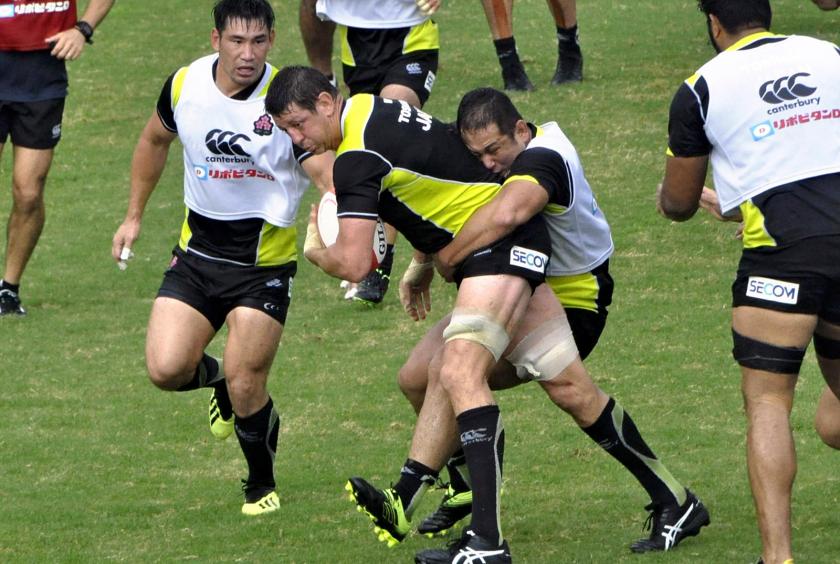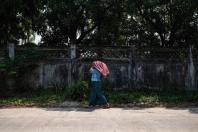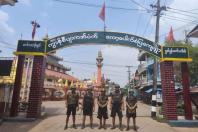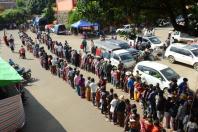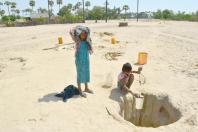TOKYO (The Japan News/ANN) - This is the third and final installment of a series on the Rugby World Cup 2019 in Japan.
“As rugby is now in the spotlight, I want it also to be on foreign players on the Japan team. They have chosen Japan over their home countries, and fought for Japan. They are the best comrades [teammates]. Their nationalities are different, but they are bearing the load for Japan. This is the essence of rugby.”
This was the message Ayumu Goromaru, Japan’s vice captain under head coach Eddie Jones, posted in Japanese on Twitter after a “giant killing” in which Japan beat two-time world champion South Africa in a pool-stage match at the Rugby World Cup in England in September 2015.
Now 33, Goromaru was the national team fullback known for the unique pose he struck during his kicking routine. His message supported the inclusion of 11 foreign-born players in the 31-member Japan national team in response to criticism against the high number of such players.
How current Japan head coach Jamie Joseph will construct this year’s roster will be revealed in late August, when each national team competing in the Rugby World Cup in Japan will release its 31-member squad list.
Forty-two candidates for the Japan national team were in training camp in Miyazaki from mid-June to mid-July. Among them, 19 have foreign origins: six are from New Zealand, five from Tonga, three from South Africa, two from Australia, and one each from Fiji, Samoa and South Korea. Nine of them do not have Japanese nationality.
Those who are unfamiliar with rugby may be surprised at the large number of foreign-born players that have been selected as Japan national team members. In addition, when it comes to the first-choice starting members, the ratio of Japan-born players could be quite low.
In past World Cups, there has been debate over the number of foreign-born players included in the Japan national teams.
In the 2011 World Cup in New Zealand, 10 foreign-born players were included in the 31-member Japan national team that ended with one draw and three losses in the pool stage.
According to an online questionnaire by Japanese sports magazine Number that year, 45 percent of respondents said that the large number of foreign-born players is “natural to win,” while 42.5 percent said there were “too many” such players. Respondents who said that they want the national team to win only with Japan-born players were 12.5 percent.
Eligibility rules
Unlike most sports where eligibility to represent a national team at the Olympics or other international sporting events is based on nationality, rugby’s eligibility rules do not consider nationality. This is largely due to how rugby has spread around the world. The sport was born in England and spread mainly through the Commonwealth in which people have moved to live in other countries and returned to their home countries. The eligibility rules were established so that people can play the sport as a national team member for the country they are living in.
World Rugby, the international rugby governing body, specifies conditions for players to become national team members, on the assumption that they have never before played for another country at the senior international level. The main eligibility rules are that the player:
■ was born in that country; or
■ has a parent or grandparent who was born in that country; or
■ has lived in that country for 36 consecutive months immediately before playing; or
■ has lived for 10 cumulative years in that country before playing.
The third condition, especially, is important for foreign-born players to be selected as Japan national team members. The 36-month residency rule will, however, be extended to 60 months from Jan. 1, 2021.
Among foreign-born players, some have obtained Japanese nationality, such as Michael Leitch, who is expected to be named the captain of the Japan national team as he was for the previous World Cup in England. He became a Japanese citizen in 2013.
Before choosing to represent Japan, Leitch had four national team options. His father has roots in Scotland, his mother is of Fijian origin, he was born in New Zealand and he lived for over three years in Japan.
Leitch studied at a high school in Hokkaido at age 15 and became a Japan national team member when he was a Tokai University sophomore in 2008. He has played for the Toshiba Brave Lupus in Japan’s Top League and the Waikato Chiefs of New Zealand in the Super Rugby international professional league for several seasons. In 2014, he was the second foreign-born player to be named captain of the Japan national team.
The 30-year-old Leitch often says that he began to seriously play rugby after coming to Japan and developed his ability while being coached in Japan, so he would like to fight for Japan and return a favor to those who took care of him.
Integral part
Looking at the number of foreign-born players in the Japan national teams at past World Cups, there were two out of the 26-member squads in 1987 and 1991, and four out of 26 in 1995. When the squad size increased to 31 members, the foreign-born players numbered six in 1999, four in 2003, eight in 2007, 10 in 2011 and 11 in 2015.
Of course, Japan is not the only country with foreign-born players in its squad. There are some major powers in global rugby that use more foreign-born players than Japan. Only Argentina seems to form a national team with players native to its country.
Three-time world champion New Zealand considers players of foreign origin, such as from Pacific island countries, as an integral part of the success of the All Blacks, as represented by legends Bryan Williams of Samoan origin in the 1970s and Jonah Lomu of Tongan origin in the 1990s. Australia is another power that adds Pacific islanders to its national team.
Jones, currently the head coach of England, took up the Japan head coaching post in 2012. He started out forming the national team mainly with Japanese players based on his policy that he uses Japanese players if they have the same capabilities as foreign-born players in the same positions.
However, he gradually increased the number of foreign-born players in the positions that he considered weaker compared with the major powers, such as centers who are strong defense-line breakers and forwards like the locks, flankers and No. 8 who are quality lineout jumpers and can penetrate the defense. His approach did not seem to receive overt criticism as the successful 2015 World Cup campaign ended with three wins largely due to the dedicated performance of foreign-born players.
Jones has said that there is no problem in using foreign-born players as England, the birthplace of the sport, also has Pacific islanders in key positions such as No. 8 and the centers.
Beyond nationality
Masatoshi Mukoyama, an associate professor of sports management at Ryutsu Keizai University who was a former rugby player for the Japan national team, told The Yomiuri Shimbun: “To become a Japan national team member, a foreign-born player must keep in good form for several years in Japan. For that purpose, he needs to accustom himself to life in Japan and respect Japanese culture. It seems tougher for a foreign-born player than a Japanese player to achieve this goal.”
In an interview with The Japan News, Hitoshi Ebishima, a professor at Seijo University and an expert on sports sociology, said: “Many Japanese people may think it’s natural that those with Japanese nationality become national team members. But in other countries it is not rare for players to have dual citizenship, so these players have a wider array of options to become a national team member for a certain country and can take into consideration how they are treated and their post-retirement career.”
In Japan, however, foreign-born players have difficulty obtaining Japanese nationality. Meeting the residency rule seems to work favorably for Japan in improving its capabilities with foreign-born players, Ebishima added.
Andrew McCormick from New Zealand, who became the first foreign-born captain of the Japan national team for the 1999 World Cup, chose to play for Japan rather than the country of his birth after abandoning his dream of becoming an All Black, which his father and grandfather played for.
In a past interview, asked whether foreign-born players were prepared to give their all for Japan, the now 52-year-old said, “[Once they were selected for the country,] both foreign-born and Japanese players should agree to die together [for winning the match] because a test match is a ‘war.’”

